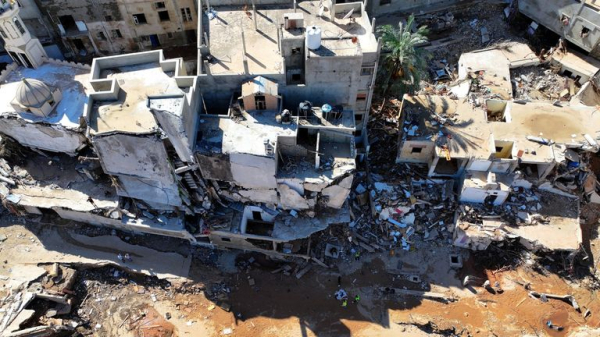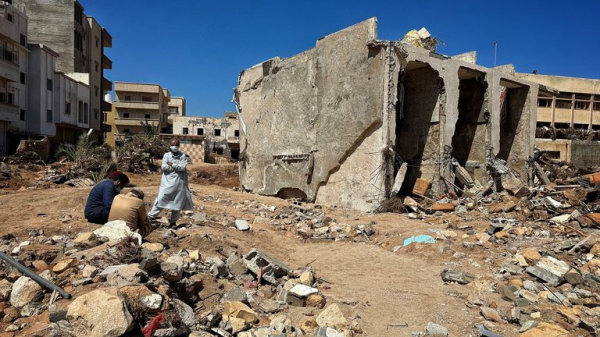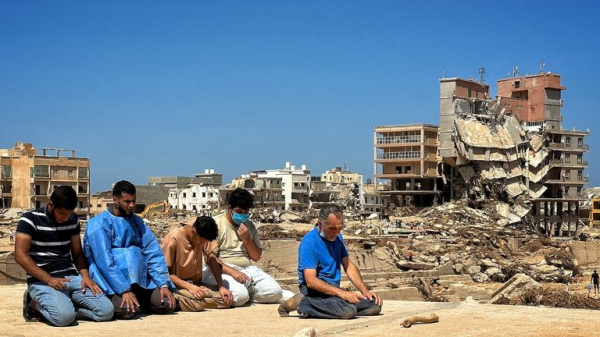Libya’s chief prosecutor vows to ‘put on trial’ those responsible for Derna dam neglect
Spreaker This content is provided by Spreaker, which may be using cookies and other technologies. To show you this content, we need your permission to use cookies. You can use the buttons below to amend your preferences to enable Spreaker cookies or to allow those cookies just once. You can change your settings at any time via the Privacy Options. Unfortunately we have been unable to verify if you have consented to Spreaker cookies. To view this content you can use the button below to allow Spreaker cookies for this session only. Enable Cookies Allow Cookies Once
The chief prosecutor of Libya’s eastern government has said he will prosecute those responsible for the neglect of two dams in Derna as the city struggles to cope with the thousands of corpses washing up or decaying under rubble.
It comes as the World Health Organisation and other aid agencies urged Libyan authorities to stop burying victims of last Sunday’s flooding in mass graves.
The organisation said such burials could bring long-term mental distress to families or cause health risks if located near the water.
According to a UN report, more than 1,000 people have been buried in mass graves since Libya, a nation divided by a decade of conflict and political chaos, was hit on Sunday by torrential rain that caused two dams to burst.
According to the Libyan Red Crescent, there were 11,300 flooding deaths in Derna as of Thursday.
Another 10,100 people were reported missing, though there was little hope many of them would be found alive, the aid group said.
Desperate search for survivors continues – latest updates
Bodies “are littering the streets, washing back up on shore and buried under collapsed buildings and debris,” said Bilal Sablouh, regional forensics manager for Africa at the International Committee of the Red Cross.
“In just two hours, one of my colleagues counted over 200 bodies on the beach near Derna,” he said.
Divers are also searching the waters off the Mediterranean coastal city.
Datawrapper This content is provided by Datawrapper, which may be using cookies and other technologies. To show you this content, we need your permission to use cookies. You can use the buttons below to amend your preferences to enable Datawrapper cookies or to allow those cookies just once. You can change your settings at any time via the Privacy Options. Unfortunately we have been unable to verify if you have consented to Datawrapper cookies. To view this content you can use the button below to allow Datawrapper cookies for this session only. Enable Cookies Allow Cookies Once

Libya chief prosecutor Al Siddiq Al Sou said on Friday evening that the public prosecutor’s office had summoned the dam’s administration and the authority responsible for water resources.
He said the investigations are focusing on the funds allocated for the maintenance of the two dams, stressing that the office has reports that cracks could be seen in them before the flooding.
“I reassure the citizens that whoever made a mistake, neglected, the prosecution will certainly take firm measures, file a criminal case against him, and put him on trial,” he said.


The number of deaths may also increase again due to the spread of waterborne diseases and moving explosives that were swept up when the two dams collapsed and sent a wall of water gushing through the city, officials warned.
Ibrahim al Arabi, health minister in Libya’s Tripoli-based western government, said he was certain groundwater was polluted with water mixed up with corpses, dead animals, refuse and chemical substances.
“We urge people not to approach the wells in Derna,” he said.

Libyan authorities have limited access to the flooded coastal city of Derna to dig through the mud and hollowed-out buildings for the more than 10,000 people still missing.
The disaster has brought some rare unity to oil-rich Libya after years of civil war between rival governments in the country’s east and west that are backed by various militia forces and international patrons.
But the opposing governments have struggled to respond to the crisis, and recovery efforts have been hampered by confusion, difficulty getting aid to the hardest-hit areas, and the destruction of Derna’s infrastructure, including several bridges.
